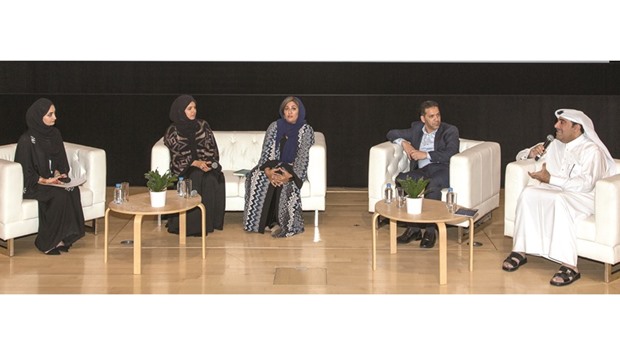Doha Film Institute (DFI) has concluded the second edition of ‘Focus on Qatar’, which celebrated local filmmaking talent in the art of documentary.
The special showcase of documentaries put the spotlight on homegrown talents that have contributed to the growth of film culture in Qatar, according to a press statement from DFI.
The final day of the programme, held at the Museum of Islamic Art, was dedicated to the industry with two panel discussions.
The first on ‘The State of Documentary in the Gulf’ included panellists Nujoom Alghanem, Emirati poet, scriptwriter and director; Jamel Dallali from Al Jazeera Documentary Channel; filmmaker Hafiz Ali Ali and DFI CEO Fatma al-Remaihi.
The panellists explored the current state of documentary filmmaking in the Gulf region. Al-Remaihi described the role of DFI in supporting local filmmaking through year-round activities and training programmes, in addition to extending finance support through the Qatari Film Fund — which is dedicated to Qataris —and through DFI’s Grants — which is open to filmmakers from across the world.
She also highlighted the institute’s annual film events of Ajyal and Qumra, which provide local filmmakers with a platform to showcase their projects, in addition to opportunities at international film festivals.
Dallali stressed the importance of increased collaborations between creative organisations to support films from the region, so “we talk about our own stories rather than staying as consumers all the time”. He said Al Jazeera Documentary extends support to all documentaries, and not just for reporting or
news-based documentaries.
Talking about the challenges, Alghanem said the domination of the television industry in documentary filmmaking makes them lose their creative and aesthetic style while concentrating on reporting. “Besides, some social traditions pose challenges for the filmmakers and the discontinuation of some regional funding opportunities was also a concern to achieve sustainable growth.”
Noting that “financing is one of the main challenges for filmmakers”, Ali said he started documentary filmmaking by relying on his own sources rather than any government entities.
He urged for more support from the relevant ministries and government entities to build on the existing base to create a sustainable film industry. The second discussion on ‘Next Generation of Documentary Filmmakers’ was an open forum for local talents, Hamida Issa and Rawda al-Thani to discuss their experiences throughout the filmmaking process, including writing, directing and editing their films. The filmmakers showcased trailers of their works in progress and talked about their filmmaking journey, from inspiration and ideas to execution – highlighting their approach to the craft and the challenges they face.
‘Focus on Qatar’ 2016 started on October 5 with the screenings of documentaries by local filmmakers, including Bader (Qatar, US, Syria/2012) directed by Sara al-Saadi, Maaria Assami and Latifa al-Darwish; The Palm Tree (Qatar/2015) by Jassim al-Rumaihi, which won the ‘Made in Qatar’ award for best documentary at Ajyal Youth Film Festival 2015; Inside Out (Qatar/2015) by Fahad al-Obaidly and Salwa al-Khalifa; To My Mother (Qatar/2015) by Amina Ahmed al-Bloshi; The Notebook (Qatar/2015) by Amna al-Binali; and Mubarak Al Malik (Qatar/2016) by Aisha R al-Muhannadi.
‘Focus on Qatar’ also had a special ‘Al Jazeera Documentary Network Showcase’. It presented a special screening of the acclaimed feature documentary, Cities of Anxiety by Mohamed Hashem, which examines the intrinsic role cities play in defining the soul of its inhabitants in times of change and uncertainty, focusing on the key cities of Beirut, Baghdad and Cairo.

Participants in a panel discussion.
